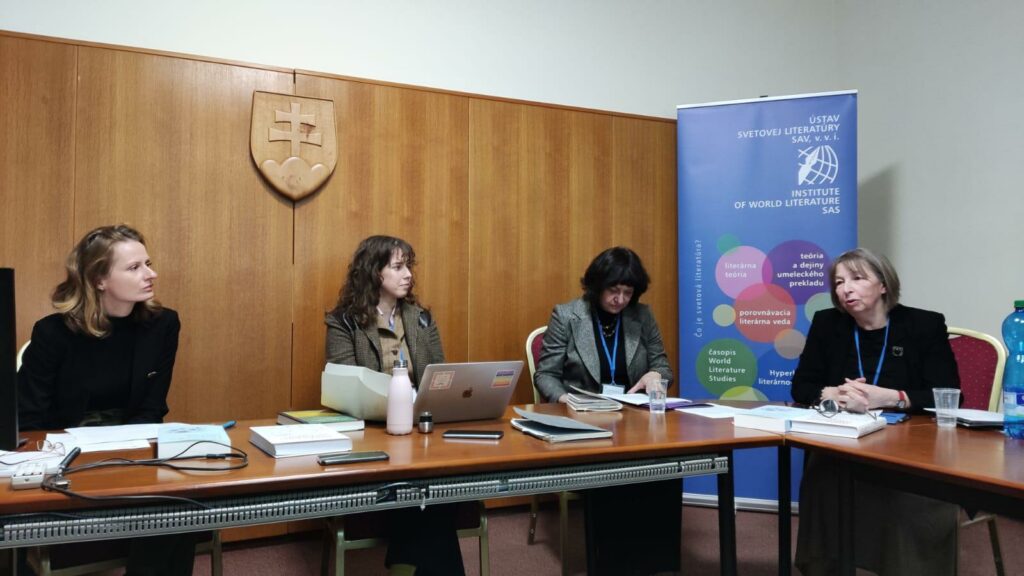V rámci francúzskej sekcie medzinárodného kolokvia Journées d’études romanes VI. Études romanes en mouvement – Dni románskych štúdií VI. Románske jazyky v pohybe, ktoré sa konalo 15. – 16. novembra 2024 na pôde Filozofickej fakulty UK v Bratislave, sa uskutočnil rokovací panel Transfert et traduction de textes des sciences humaines et sociales (Transfer a preklad textov socio-humanitných vied), ktorého sa zúčastnili aj naše kolegyne – Katarína Bednárová, Silvia Rybárová a Jana Truhlářová. Rokovanie sa konalo pod gesciou profesorky Bednárovej, ktorá priblížila aktuálny výskum v rámci prebiehajúceho projektu APVV-21-0198 Preklad a aspekty recepcie spoločenskovedných a humanitnovedných textov ako kultúrny a literárny transfer v 20. storočí. Silvia Rybárová predstavila prítomným kolektívne dielo Pokračovať na Prezentácia najnovších publikácií Ústavu svetovej literatúry SAV
Archív kategorií: Správy
Navrhnite si vlastnú tému a poďte k nám študovať PhD
Ak premýšľate o doktorandskom štúdiu literárnej vedy, napíšte nám najneskôr do 15. januára 2025, čomu by ste sa chceli venovať. Radi budeme s vami konzultovať o možnostiach a ďalšom postupe.
Aké je také doktorandské štúdium u nás, vám rád prezradí doktorand Adam Škrovan a načo vám také štúdium môže byť, sa zasa dozviete od našich úspešných absolventiek a absolventov: Zuzana Kopecká, PhD. (2021), Tamara Šimončíková Heribanová, PhD. (2020), Krištof Anetta, PhD. (2019), Lívia Paszmár, PhD. (2017), Anna Fosse, PhD. (2017), Terézia Struhárová, PhD. (2014), Zuzana Husárová, PhD. (2009).
Viac informácií nájdete TU.
Indický premiér o slovenskom preklade UPANIŠÁD Róberta Gáfrika
Indický premiér Naréndra Módí vo svojej pravidelnej relácii Man kí bát (v angl. prepise Mann Ki Baat), v hindčine „Slová od srdca“, hovorí v novembrovom vydaní o preklade UPANIŠÁD do slovenčiny z pera nášho riaditeľa, doc. Róberta Gáfrika.
Man kí bát je apolitická relácia, prostredníctvom ktorej indický premiér Naréndra Módí oslovuje národ na rozhlasovej stanici All India Radio a na televíznych staniciach DD National a DD News. Premiér sa v nej delí o svoje myšlienky na rôzne témy a hovorí o úspechoch krajiny. Relácia sa vysiela v hindčine a prekladá sa do rôznych regionálnych jazykov. Je dostupná aj na internete a prostredníctvom sociálnych sietí. Každý mesiac ju počúvajú stámilióny ľudí.
Pozvánka na prezentáciu 5. decembra
Ohliadnutie za podujatím o preklade byzantsko-slovanských liturgických textov
Súčasťou projektu APVV-21-0198 Preklad a aspekty recepcie spoločenskovedných a humanitnovedných textov ako kultúrny a literárny transfer v 20. storočí je diseminácia poznatkov získaných počas jeho riešenia. Ústav svetovej literatúry SAV, v. v. i., a Katedra spoločenských a humanitných vied Gréckokatolíckej teologickej fakulty Prešovskej univerzity zorganizovali v rámci projektu diskusné podujatie na tému Preklad byzantsko-slovanských liturgických textov ako špecifický typ transferu.
V prvom bloku podujatia zúčastnení diskutovali o dejinách a aktuálnych výzvach liturgického prekladu v Gréckokatolíckej cirkvi na Slovensku. Slavista a teológ Andrej Škoviera priblížil prvé prekladateľské počiny slovenských gréckokatolíkov s osobitným dôrazom na prekladateľské dielo Pavla Spišáka. Historickým aspektom prekladu sa venoval aj Daniel Atanáz Mandzák, šéfredaktor vydavateľstva Misionár a člen rehole, ktorá sa v druhej polovici 20. storočia a najmä začiatkom 21. storočia zaslúžila o vydanie niekoľkých publikácií s prekladmi stálych a premenlivých častí časoslova. Na základe archívnych materiálov, ale aj osobných spomienok predstavil proces prípravy publikácií, ktorý spočíval v kompilácii prekladov rôznej (neraz amatérskej či študentskej) proveniencie a ich následnej jazykovej korektúre. Pokračovať na Ohliadnutie za podujatím o preklade byzantsko-slovanských liturgických textov
Za hranicami v preklade: poznanie, fakty, príbehy

V utorok 15. 10. 2024 sa o 18.00 zišli v kníhkupectve a antikvariáte Pod vŕškom na Kupeckej ulici v Nitre študentstvo Filozofickej fakulty Univerzity Konštantína Filozofa v Nitre i širšia verejnosť so záujmom o preklad a literatúru na diskusnom večere o knihe Zuzany Palovic a Gabriely Beregházyovej Slovak Settlers: The emotional history of immigration/Slovenskí vysťahovalci: história slovenského vysťahovalectva (Global Slovakia 2023) v slovenskom preklade Beáty Ďuračkovej.
O knihe a jej preklade do slovenčiny, o prekladateľskej práci, špecifikách prekladu socio-humanitnej literatúry a hraniciach odborného a umeleckého prekladu sa zhovárali prekladateľka Beáta Ďuračková a spoluautorka knihy Gabriela Beregházyová, absolventka University of Exeter, University of Bristol a University of Surrey, kde ukončila doktorandské štúdium s prestížnym štipendiom na výskum vnímania korupcie na Slovensku. Podujatie pripravila a moderovala Ľudmila Pánisová z Katedry translatológie UKF v Nitre, spoluriešiteľka projektu APVV-21-0198 Preklad a aspekty recepcie spoločenskovedných a humanitnovedných textov ako kultúrny a literárny transfer v 20. storočí. Pokračovať na Za hranicami v preklade: poznanie, fakty, príbehy
Nové číslo World Literature Studies 3/2024: Preklad, cenzúra a marginalizované hlasy
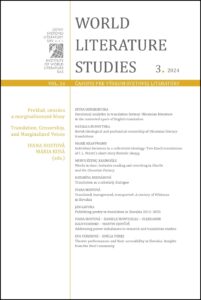 eds. Ivana Hostová ‒ Mária Kusá
eds. Ivana Hostová ‒ Mária Kusá
Toto translatologické číslo sa zameriava na postihnutie prienikov medzi prekladom a mocou, cenzúrou a marginalizovanými identitami. Jednotlivé štúdie si všímajú, ako preklad vzdoruje štruktúrnemu útlaku, respektíve ako ho upevňuje, a to najmä v kontexte strednej a východnej Európy. Tematicky sa venujú otázkam ako kurátorstvo kultúrneho exportu, cenzúra v literárnom preklade či politická ekonómia recepcie. Zviditeľňujú tiež rolu, ktorú prekladateľky a prekladatelia zohrávajú pri formovaní teórie, a obhajujú dekolonizáciu poznania a inkluzivitu v globálnej kultúrnej produkcii.
Číslo 3, 2024, ročník 16 vyšlo v rámci kolektívneho projektu VEGA 2/0092/23 Preklad a prekladanie v dejinách a súčasnosti slovenského kultúrneho priestoru. Premeny podôb, statusu a funkcií: texty, osobnosti, inštitúcie, ktorý vedie prof. Mária Kusá (Ústav svetovej literatúry SAV, v. v. i.). Editovala ho spolu s Ivanou Hostovou (Ústav slovenskej literatúry SAV, v. v. i.).
Časopis pre výskum svetovej literatúry vydáva štyri razy ročne Ústav svetovej literatúry SAV, v. v. i.
online v režime otvoreného prístupu: Licensed under Creative Commons BY-NC-ND 4.0;
tlačou: Objednávky vybavuje Slovak Academic Press, s. r. o., sap@sappress.sk, cena 1 čísla 6 EUR, celého ročníka 24 EUR plus poštovné.
Z obsahu:
IVANA HOSTOVÁ ‒ MÁRIA KUSÁ
Translation, censorship, and marginalized voices: Challenging power and
economic barriers
IRYNA ODREKHIVSKA
Decolonial analytics in translation history: Ukrainian literature in the contested
space of English translation Pokračovať na Nové číslo World Literature Studies 3/2024: Preklad, cenzúra a marginalizované hlasy
O konferencii „Milan Kundera a světová literatura“ v Bratislave
V utorok 8. októbra 2024 sa v Českom centre v Bratislave konala konferencia pod názvom „Milan Kundera a světová literatura“. Na organizácii podujatia pri príležitosti 95. výročia narodenia a 1. výročia úmrtia tohto spisovateľa sa okrem Českého centra podieľalo Veľvyslanectvo Českej republiky spolu s Ústavom stredoeurópskych jazykov a kultúr Fakulty stredoeurópskych štúdií UKF, s Ústavom svetovej literatúry SAV, v. v. i., a Česko-slovenskou asociáciou porovnávacej literatúry.
Počas konferencie vystúpili s príspevkami z rôznych hľadísk prednášajúci z viacerých krajín. V referátoch sa venovali Kunderovej prozaickej aj esejistickej tvorbe, v ktorej sa okrem iného zamerali na humor a snovú tematiku, kultúrnu identitu a problematiku prekladov, ako aj otázke miesta Kunderu v literatúre, resp. svetovej literatúre, zaoberali sa i autorovou osciláciou medzi centrom a perifériou a nevynechali ani jeho vnímanie románu a umeleckej tvorby. Viacerí prednášajúci Milana Kunderu osobne poznali a diskusiu obohatili o vlastné spomienky na rôzne podnetné rozhovory, pričom ho pripomenuli aj ako človeka. Príspevky z konferencie budú publikované v monotematickom čísle časopisu Stredoeurópske pohľady č. 1/2025.
 Text a foto:
Text a foto:
Karolína Albertová a Martina Vladovičová
Cena Literárneho fondu Adamovi Bžochovi
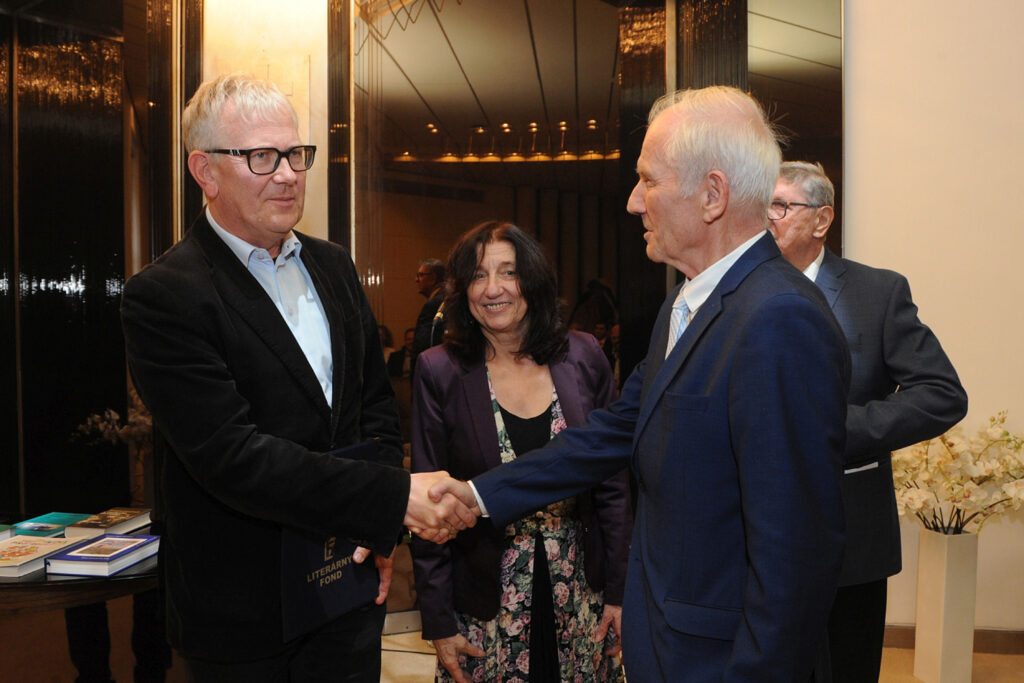
 Srdečne blahoželáme: Literárny fond udelil profesorovi Adamovi Bžochovi Cenu za vedeckú a odbornú literatúru za rok 2023 v kategórii humanitných vied. Ocenená monografia Konverzácia a európska literatúra (Vyd. Európa, s. r. o., 2023), ktorá vznikla na pôde Ústavu svetovej literatúry SAV, prináša plastický a v čase sa meniaci obraz vzťahov medzi spoločenskými normami a umelecky stvárňovanou realitou neformálneho hovorenia v rôznych častiach Európy. Odpovedá tak na otázky súvisiace s prchavým javom spoločenského rozhovoru a jeho kultúrnym významom.
Srdečne blahoželáme: Literárny fond udelil profesorovi Adamovi Bžochovi Cenu za vedeckú a odbornú literatúru za rok 2023 v kategórii humanitných vied. Ocenená monografia Konverzácia a európska literatúra (Vyd. Európa, s. r. o., 2023), ktorá vznikla na pôde Ústavu svetovej literatúry SAV, prináša plastický a v čase sa meniaci obraz vzťahov medzi spoločenskými normami a umelecky stvárňovanou realitou neformálneho hovorenia v rôznych častiach Európy. Odpovedá tak na otázky súvisiace s prchavým javom spoločenského rozhovoru a jeho kultúrnym významom.
Vedeckými recenzentmi publikácie boli prof. PaedDr. Martin Golema, PhD., a PhDr. Fedor Matejov, CSc. Teší nás, že zároveň môžeme zablahoželať Fedorovi Matejovovi, Pokračovať na Cena Literárneho fondu Adamovi Bžochovi
Ocenenie za špičkovú monografiu pre Johannesa Kaminského
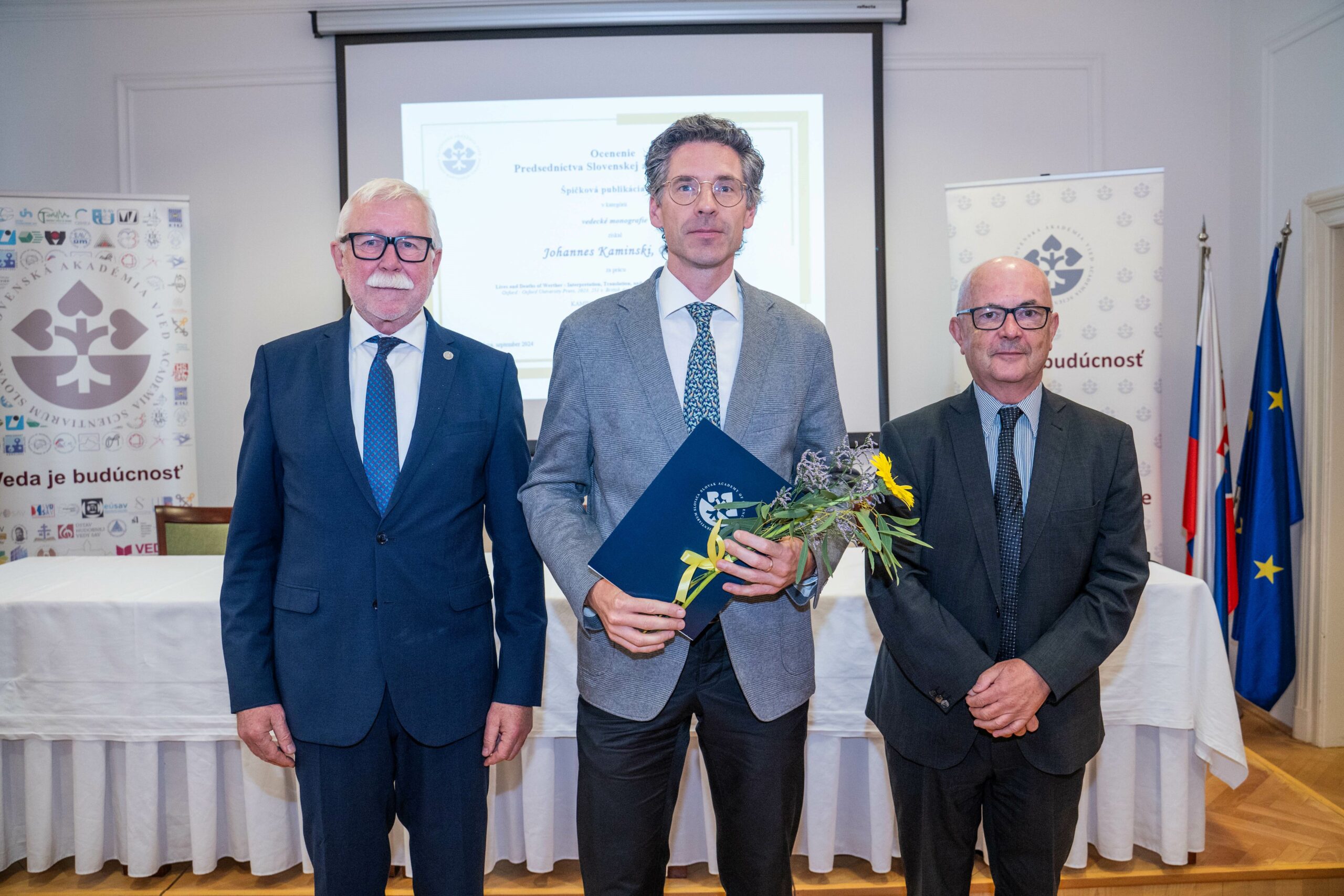 Gratulujeme nášmu kolegovi Johannesovi D. Kaminskému k oceneniu špičková monografia SAV za publikáciu Lives and Deaths of Werther. Interpretation, Translation, and Adaptation in Europe and East Asia (Životy a smrti Werthera: výklad, preklad a adaptácia v Európe a východnej Ázii), ktorá vyšla v decembri minulého roka vo vydavateľstve Oxford University Press. Spolu s ďalšími pracovníčkami a pracovníkmi SAV si toto osobitné ocenenie svojej práce prevzal 18. septembra od predsedu SAV prof. Pavla Šajgalíka a podpredsedu SAV pre vedu, výskum a inovácie prof. Petra Samuelyho. Informáciu o všetkých oceneniach nájdete TU.
Gratulujeme nášmu kolegovi Johannesovi D. Kaminskému k oceneniu špičková monografia SAV za publikáciu Lives and Deaths of Werther. Interpretation, Translation, and Adaptation in Europe and East Asia (Životy a smrti Werthera: výklad, preklad a adaptácia v Európe a východnej Ázii), ktorá vyšla v decembri minulého roka vo vydavateľstve Oxford University Press. Spolu s ďalšími pracovníčkami a pracovníkmi SAV si toto osobitné ocenenie svojej práce prevzal 18. septembra od predsedu SAV prof. Pavla Šajgalíka a podpredsedu SAV pre vedu, výskum a inovácie prof. Petra Samuelyho. Informáciu o všetkých oceneniach nájdete TU.
Originálny vedecký prínos monografie spočíva okrem autorovej výnimočnej jazykovej kompetencie v neobvyklej komparatistickej konštelácii európskych a východoázijských recepcií, pričom skúma neeurocentrické hodnotenie jedného z najslávnejších románov západnej kultúry.
Open access HERE. 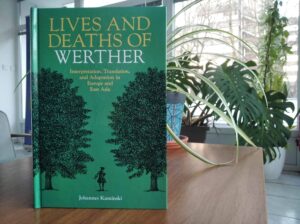
Záznam z prednášky: Zsolt Czigányik – Utopia in Central Europe
 Zsolt Czigányik je docentom na Katedre anglistiky na Univerzite Eötvösa Loránda (ELTE) v Budapešti a vedúci výskumného tímu Democracy in East Central European utopianism (Demokracia v utopizme stredovýchodnej Európy), ktorý je financovaný nadáciou Gerda Henkel Foundation na Stredoeurópskej univerzite. Je tiež tajomníkom Utopian Studies Society (Spoločnosti pre výskum utópie). Jeho výskumným zameraním sú moderná utopická a dystopická literatúra. Prinášame vám záznam hosťovskej prednášky, ktorú 24. apríla 2024 predniesol na pôde Ústavu svetovej literatúry SAV, v. v. i..
Zsolt Czigányik je docentom na Katedre anglistiky na Univerzite Eötvösa Loránda (ELTE) v Budapešti a vedúci výskumného tímu Democracy in East Central European utopianism (Demokracia v utopizme stredovýchodnej Európy), ktorý je financovaný nadáciou Gerda Henkel Foundation na Stredoeurópskej univerzite. Je tiež tajomníkom Utopian Studies Society (Spoločnosti pre výskum utópie). Jeho výskumným zameraním sú moderná utopická a dystopická literatúra. Prinášame vám záznam hosťovskej prednášky, ktorú 24. apríla 2024 predniesol na pôde Ústavu svetovej literatúry SAV, v. v. i..
Utópia sa nachádza v priestore nikoho medzi literatúrou, sociálnou filozofiou a spoločenskými vedami, kde sa prelínajú literárne a sociopolitické faktory. Podľa historika Pétera Hanáka je stredná Európa regiónom, kde sa realita a utópia odjakživa miešali. Zsolt Czigányik vo svojej prezentácii skúma oba koncepty: ako utopické literárne diela odrážajú spoločenskú a politickú realitu a ako bol tento žáner, ktorý vznikol v západnej Európe, prijatý a rozvíjaný v našom regióne. Na základe vlastného výskumu anglickej a maďarskej utopickej literatúry v stručnosti načrtáva, ako rozumie pojmu utópia a neustále sa meniacemu označeniu stredná Európa ako priestoru na pomedzí Východu a Západu. Záznam prednášky v anglickom jazyku nájdete TU.
